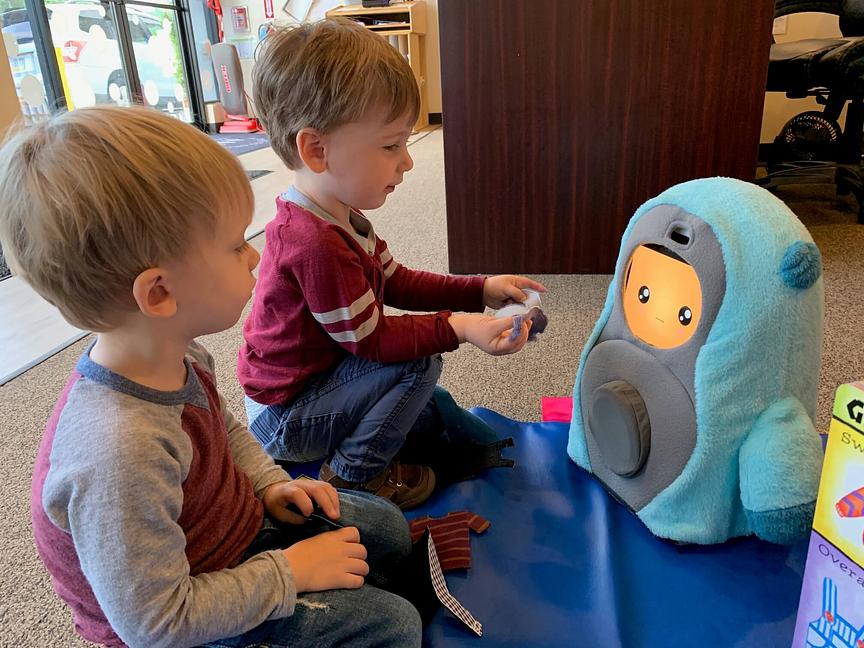Fine Art Miracles, Inc. (FAM) has a mission to serve both challenged and neuro-typical children with social robotic learning enhancements that ignite communication and change an “I can’t” attitude into a resounding “I can!” This opens a world of possibilities for all children and bolsters inclusiveness in their classrooms and in their communities.
We were first introduced to Social Robotics through Aubrey Shick inventor of the Romibo Robot, specifically made to work with children on the autism spectrum. Together, we completed a pilot program for Carnegie Mellon University, taking Romibo out of the laboratory and into a real-time classroom for the first time. We were so excited at the success of the program, that we continued to partner with Shick to develop FAM's social robotics enhanced learning program. (Today Aubrey Shick is FAM Head of Research and Technology.)
After seeing the way childen (with and without autism) respond to social robots in art therapy sessions, FAM decided to bring the robot into preschools, where children were having difficulty settling into a school setting, being on their own, socializing, making choices and taking turns. Our experience with challenged primary school students and typical preschoolers, gave the illusion that preschoolers with challenges was the next natural step. At that time, we didn’t know what we didn’t know.
It turned out we needed a whole new robot and a new methodolgy! Children respond best to a robot that resembles a peer—a best friend, a pet, a buddy. FAM made and discarded about 20 robot prototypes before discovering we needed a smaller, simpler, softer robot for these very early learners. Simple bright colors, an off-the-charts-cute face and a humanoid, but still robotic voice. The robot resembles a peer but remains a robot—essential for the HRI to occur!
Next, we needed the time frame to be shortened, punctuated with a beginning, middle and end and the duration could not go longer than 12 to 15 minutes.
Third, we had to keep the kids actively engaged. Our lessons had to be fun and learning had to be disguised as playing. Based on our experience using sensory coverings for kids on the autism spectrum, we decided to try our hand at creating a new version of these, exploring SEL for early learners.
We also wanted to combine literacy with SEL, so we examined lots of books, got recommendations from teachers, moms, librarians, and made very specific choices. Next we chose simple themes from each book, composed a robotic conversation, game, or activity and we dissected the books to create soft appliques for the newly christened: FAM Learning Mats.
Now, our softbot named, “Migo,” had a platform. And PEERbot was born.
PEERbot was tested in the home and in school settings with children from 11 months to 3 years of age. We got better at helping Migo deliver a smooth dialogue; information and questions; at keeping the kids engaged and following a shortened methodolgy. So far, the children appear to love the experience. They engage with Migo and with the Learning Mat. Sometimes shy to begin, once Migo starts talking, the children respond. They giggle and slowly reach out to touch him. As the minutes progress they follow his directions, helping one another, sharing the objects, responding to questions about, “what a pig says,” or “whether a horse climbs trees,” and, “where a chicken lives;” or questions about colors, numbers, shapes and more.
All sessions are evaluated digitally, using the following measures:
- Pre/During/Post classroom teacher goals and learning objective assessments, with facilitator weekly reports on progress - Likert scale reports and photo-documented completed work.
- PEERbot Instructor evaluations with simplified coding schemes based on the Zones of Regulation curriculum by Leah Kuypers.
- PEERbot Instructor surveys noting: eye contact, personal space, verbalization between child peers and the teacher (and sometimes social robots) before/during/after each session.
FAM’s programs have seen positive results in the areas of Social Emotional Learning, using social robots as peer agents. These PEERbots are particularly effective for students who have difficulty learning from standard social skills programming. Teachers, especially those in under-performing school districts, express an urgent need to bring challenged students to the same level of competency as their typically developing counterparts. Many educators in preschools, daycare centers and early learning programs are keenly aware of this need and are looking to FAM, for innovative solutions.

.jpg)

